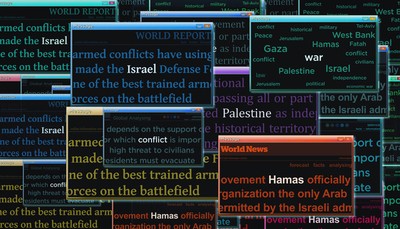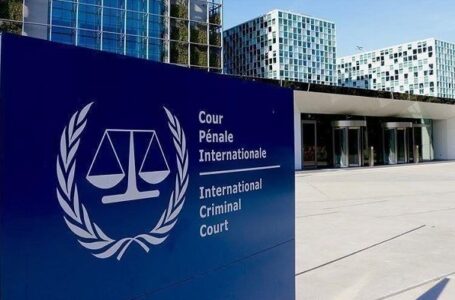Unethical Gaza Reporting Cuts Crucial Context

by Noah Beck
Special to IPT News
November 5, 2023
w.investigativeproject.org/9348/unethical-gaza-reporting-cuts-crucial-context
Re: post authorized for ConservactiveChoiceCampaign.com
The adage that “journalism is the first draft of history” understates the impact that journalists have on the present, given that their reporting can change perceptions and public discourse in a way that shapes the history being recorded in that first draft.
The media’s ethical duties and challenges are among the greatest when it comes to reporting on the Israeli-Palestinian conflict, an issue plagued by misinformation and disinformation, and where passions are inflamed by reports that can quickly affect events on the ground. Compounding those concerns is the broader geopolitical context of reporting in the Middle East, a volatile region of proxy wars, terrorism by state and non-state actors, and nuclear weapons and proliferation.
Failures to adhere to journalistic standards can perpetuate the Israeli-Palestinian conflict by creating a moral equivalence between Hamas and Israel that leads global public opinion and world leaders to pressure Israel into allowing a baby-burning terror group at its doorstep to prepare for the next round of war, within months after the latest round of violence, rather than allowing Israel to defeat Hamas once and for all.
Through defamatory allegations of “genocide,” anti-Israel activists add to the global pressure on Israel that prevents it from militarily eliminating the Hamas threat, a necessary step towards any improvement in the lives of both Gazans and Israelis, given Hamas’ commitment to killing all of the Jews in the world (as the organization clearly states in its charter). So while activists and the media outlets that quote them (like Al Jazeera) ignore the very genocidal elements in Hamas’ foundational document, they will absurdly allege that Israel is engaged in a “genocide” against Gaza, but never explain why such a powerful army needs nearly two decades and multiple wars to accomplish this “genocide,” when the Israeli military could easily do so in a day.
It is Israel’s own extraordinarily high ethical standards that have prevented it from committing “genocide,” despite countless vicious Hamas attacks whose barbarism has gotten progressively worse over the last few decades, culminating in the October 7th slaughter of 1,400 Israelis, which is the equivalent of almost 52,000 deaths in the USA – about seventeen September 11s in one day, or about 1.3 times the 39,000 people killed by the nuclear bomb over Nagasaki. And the horrific savagery of those murders even in far smaller numbers would likely prompt most militaries in the world to act far more aggressively and decisively than Israel has thus far. Indeed, it is the many battlefield advantages that the Israeli Defense Force (IDF) concedes to its enemies, in order to comply with the IDF’s exceptionally high ethical code, that have led observers, including British military expert and war hero Richard Kemp, to note that the IDF is the most moral army in the world. In the October 9, 2009 debate on the infamous Goldstone Report issued in the wake of Operation Cast Lead, Colonel Kemp asserted that “the Israeli Defense Forces did more to safeguard the rights of civilians in a combat zone than any other army in the history of warfare.”
Yet journalists quickly forget these ethically crucial details and too often fail to provide critical context for those trying to gain a meaningful understanding of the conflict and the moral character of each side. And the international community – fueled by the unethical and/or sloppy reporting of so many journalists – forces Israel into accepting military half-measures that simply bring a temporary “quiet” to the region. Tragically, the international pressure for cease fires that allow the root problem of Hamas to fester have proven to be utterly counterproductive, even from the perspective of those claiming to care about the Palestinians, because leaving Hamas in power condemns Gazans to indefinite suffering with only brief respites that end as soon as Hamas decides once again to launch violent attacks against its northern neighbor.
But bad journalism does more than perpetuate the conflict – it actually aggravates it. By omitting crucial context or publishing inflammatory rumors rather than verified facts, the news media fuel a dangerous strategy preferred by Palestinians: inciting fury on the Arab street (often by claiming that Jews are endangering the Al-Aqsa mosque or grossly exaggerating Palestinian casualty figures, as with the 2002 libelously labeled “massacre” in Jenin). The more the Arab street is enraged by misleadingly incomplete or patently false news, the more likely an already combustible situation can quickly spin out of control, with more attacks on Israel by “lone-wolf” attackers, terrorist groups, and/or Arab states feeling public pressure to jump into the fray (as is the current concern with Lebanon, a failed state that is effectively ruled by the Iran-backed terror group Hezbollah).
And even when the conflict of the day finally calms down, after however many lives have been lost and billions of dollars of damage has been done, the unethical news reports disseminated during the war will have still left their mark on the hearts and minds of the whole region and beyond, making it that much harder for Arab regimes to support any long-term peace agreement and/or apply any pressure on the Palestinians regarding their intransigence, incitement and terrorism.
As the saying goes, a lie can travel halfway around the world before the truth can put its pants on. So when the hastily written first draft of history, produced without proper context or verification, travels far and wide, the damage is done. On the rare occasions that the news media admit their mistakes, there are no massive protests assembled on college campuses and in major cities around the world to vocally apologize for all of the previous marches and condemnations based on bad journalism. The United Nations doesn’t retract any of its statements or resolutions that were issued in the wake of biased reporting.
When a crafty lawyer manages to display inadmissible evidence before a jury, the judge will instruct the jury to disregard that information, but every psychologist knows that the jurors’ minds have been impacted in a way that cannot be easily undone. Similarly, the harms of unethical journalism inflicted upon Israel, a tiny, embattled democracy, persist long after the conflict being reported on has ended.
Tomorrow, we will detail the many reasons why Hamas is an extremely unreliable source and examine 8 examples of how different media outlets handle this fact when reporting on the latest death tolls in Gaza in part 2 of this story, Why Hamas is an Unreliable Source and How Many Reporters Fail to Disclose This.
Noah Beck is the author of The Last Israelis, an apocalyptic novel about Iranian nukes and other geopolitical issues in the Middle East.
Copyright © 2023. Investigative Project on Terrorism. All rights reserved.
Related Topics: Noah Beck, Gaza, Hamas, Israel, Journalism, Media, Israeli-Palestinian conflict, Al Jazeera















